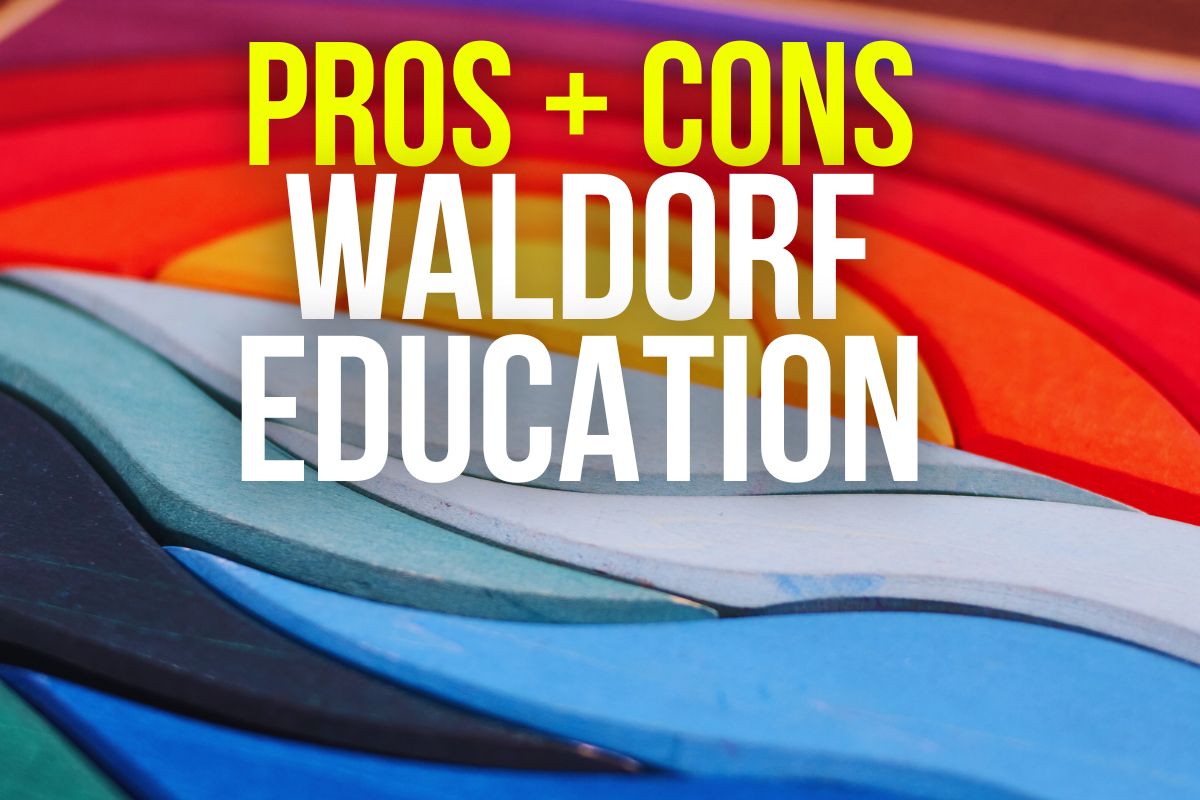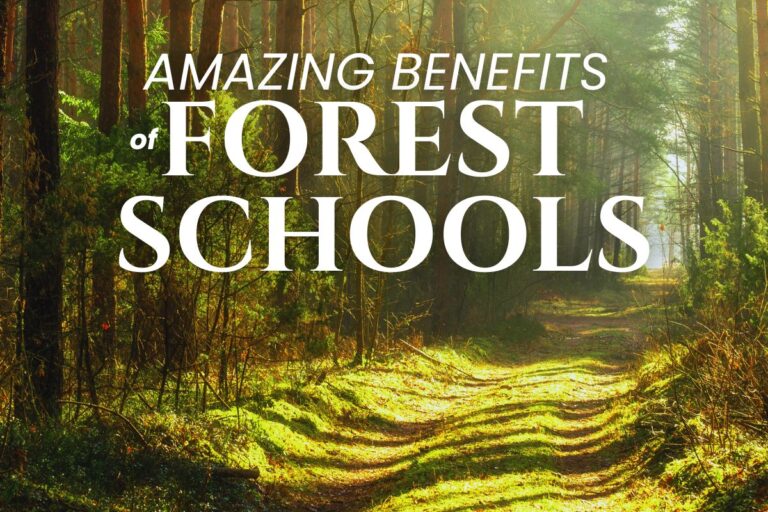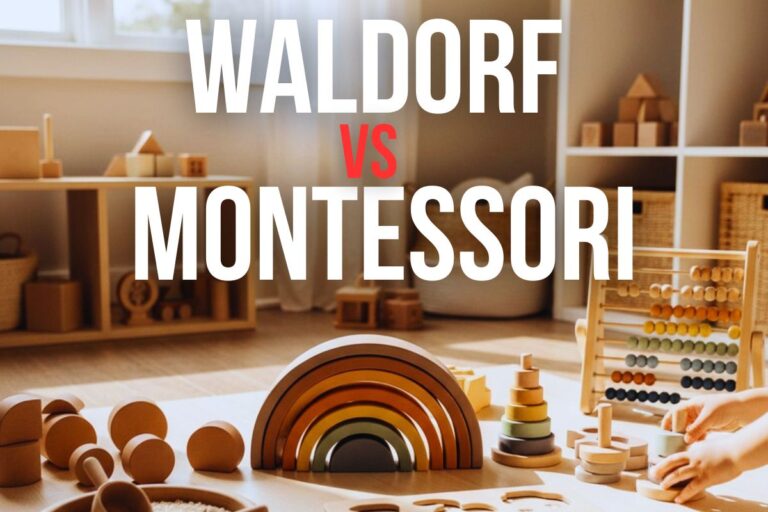Waldorf Education Pros and Cons (From a Teacher/Parent)
The Misfit Teacher contains affiliate links which means that if you make a purchase using one of these links, I may receive compensation at no extra cost to you. Read my disclaimer for more information.
Are you considering Waldorf education for your child and want an unbiased review of the pros and cons? Then, you’re in the right place.
I’m a qualified teacher with 10 years of experience in the public school system; one of my children attends public school, and the other is currently in a Waldorf school.
So, as a teacher and a parent – I’ve seen both sides of the coin and can give you unbiased feedback.
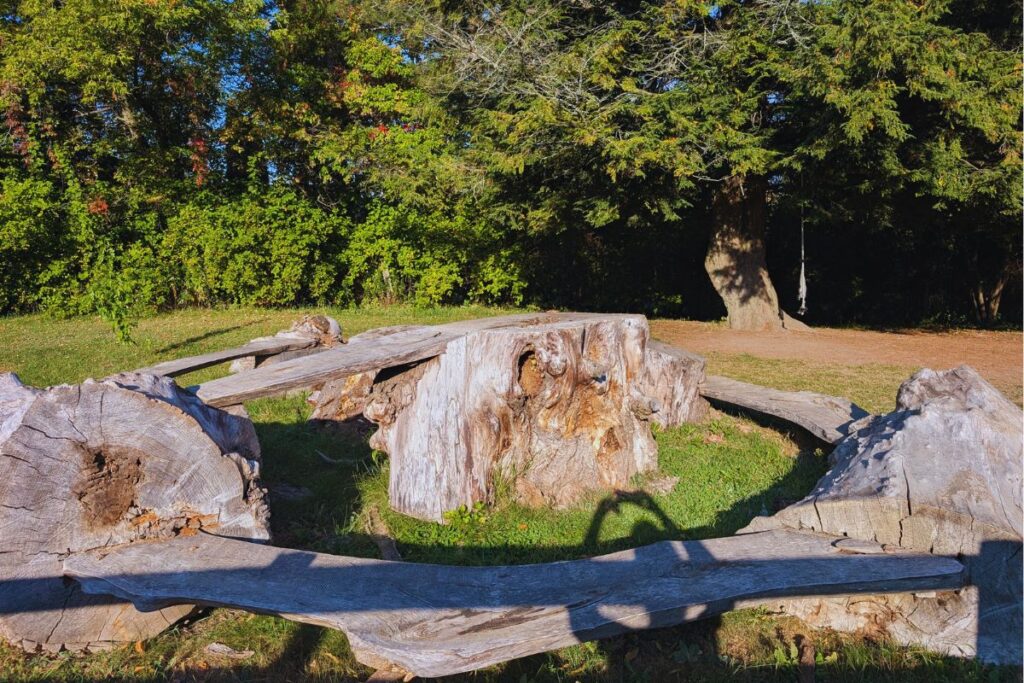
I had never heard of Waldorf education until I started considering sending my child to the local forest school in our area, which happens to be a Waldorf school.
I’m going to break down everything you need to know to make the best decision; whether you’re interested in Walforf only, or comparing it to another education style like Montessori.
So, let’s dive in – the pros and cons of Waldorf schools to make the best decision for your family.
Things to Keep in Mind About Waldorf Schools (As You Read the Pros and Cons)
There are pros and cons of Waldorf education written all over the internet, but there are a few things to be aware of as you’re reading them and allowing them to factor into your final decision
# 1 Anthroposophy
When reading online about pros and cons of Waldorf, you’ll probably read the word ‘anthroposophy’ a lot.
Anthroposophy is basically the core belief system of Rudolph Steiner, who founded Waldorf education. It’s a spiritual belief system that is interesting, although may sound ‘woo woo’ or hippie to some.
Anthroposophy is about human connection to the universe. You can read more in depth about the spiritual philosophy here. But, that aside from that, you need to know:
- Anthroposophy isn’t a subject that is ‘taught‘ in Waldorf schools; its just the foundation on which their educational philosophy surrounds
- All Waldorf schools will vary in how much their educational philosophy is rooted in anthroposophy
# 2 Not all ‘Waldorf schools’ can be painted with the same brush
Waldorf schools will share many similarities, but as you read about the pros and cons, you have to realize that all of them are school-dependent.
Most Waldorf schools are privately owned and run, so it will come down to the owner, director and the teachers how they do things at their school.
A few questions to ask as you’re researching the school of your choice:
- Is it Waldorf-inspired or is it a Waldorf school?
- Are the teachers Waldorf-certified?
# 2 It always comes down to your values
There is no ‘right or wrong’ when it comes to whether Waldorf education would be a benefit to your child – it comes down to:
- how you interpret the core values of Waldorf
- how your own individual child will take to them
I personally love the Waldorf values and my kindergartener is thriving in the Waldorf school she attends.
I’ve carefully combed over its criticisms online and some I don’t agree with, or I view it differently.
That’s why I’m going to provide you the unbiased pros and cons (seen from both sides) below.
I believe it goes without saying that Waldorf is highly beneficial to all young children under 7. The outdoor time, free play, and imaginative play are things that many mainstream schools have adapted – they’re not unique to Waldorf schools. I think the debate about whether your child would thrive in a Waldorf school comes in more once they reach school-age as that’s when Waldorf starts to look very different from what the education experience would look like in a regular school.
With those things in mind, let’s jump into the pros and cons of Waldorf schools in general!
Honest Pros and Cons of Waldorf Education
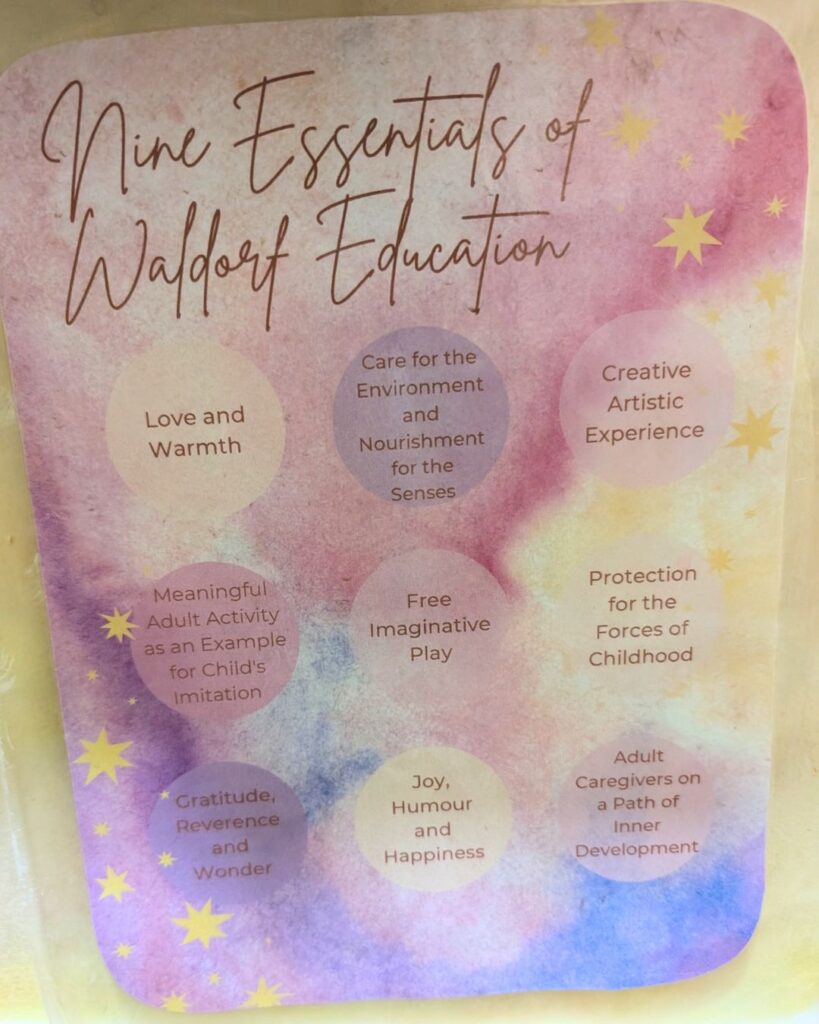
Pros of Waldorf education (Reasons to sign your kid up right now!)
The nine essentials of Waldorf education. I think the 9 essentials (which you can read about here) are very child-oriented and foster a safe , cozy environment which make learning more fun. For example, the first essential is “love and warmth.” At my daughter’s school, the kids get to wear slippers inside, they encourage parents to send warm soups for lunch, they use natural lighting. It creates a ‘comfy’ atmosphere
Imagination, creativity, and critical thinking are a huge part of the curriculum. Art, dance and drama is a big part of the curriculum in Waldorf schools. They sing every day, tell stories, do puppet shows, painting and sculpting. It’s more art-based than most other education systems. Some Waldorf schools in French-speaking areas are called “Ecole Imagine”, because imagination and free play is a big part of it.
The nature-based, forest component. Not all Waldorf schools are forest schools, but all Waldorf schools do have a large nature-based component because connection to nature is deeply embedded in the anthroposophy philosophy. There are so many benefits to the extra time outdoors that kids get when they’re in a Waldorf school
Students learn skills that they’d likely never learn if not for a Waldorf school. Students in Waldorf schools generally learn to forge, harvest, garden, do wood-work, knit and sew, how to make bricks. Many of these things are still useful, but they are ‘lost arts’ that most kids don’t get to learn
There tend to be smaller class sizes. smaller than what you’d find in a regular public school (this tends to be the case with private schools in general)
The holistic approach to education. Rather than being strictly academic, Waldorf thinks about the whole child; nurturing their emotional and mental state rather than just their academic achievement and learning
The focus on collaborative tasks. I like the collaboration aspect of Waldorf education, and it was what made me choose it over Montessori. Humans evolved to do things together, and I like how the Waldorf school has the kids do things in a team, such as baking bread, caring for animals, etc.
Waldorf students tend to have good outcomes; most attend university. Despite them having a less traditional academic approach, it seems that kids that come from a waldorf background go on to. The Waldorf Academy of Toronto shared that 94% of Waldorf school graduates attend college or university.
They’re environmentally friendly. Waldorf schools tend to be big on waste-free, earth-friendly products
Cons to Waldorf education (Potential downsides to consider)
There is less focus on academics in the early years. This is likely a good thing, as studies have shown, but it may be seen as a con by some people, depending on what you value in early years education.
They tend to be less focused on grades overall. Waldorf schools will vary on how they go about calculating and sending home grades, but overall there is a bit less focus on marks than in a traditional school. In the Waldorf Academy of Toronto for example, students receive grades (numeric or letter) starting from Grade 5. There are pros and cons to this approach, but some cons are that it might be harder to assess how they’re doing academically before Grade 5
Possible lack of availability of specialty teachers. At our local Waldorf schools, I dont know if they learn French or if they have any fully qualified French teachers, which the public schools have better access to.
There could be a delay in diagnosing kids with special needs. The public school system has systems in place to screen kids very early, for reading and other learning challenges. Since Waldorf doesn’t focus on reading or strong academics in the early years, they may not catch it if your child is going to have a harder time grasping reading than other kids their age
Most Waldorf schools are private schools. The majority of Waldorf schools are privately owned. This means that they cost extra money, and can be inaccessible to some families.
Kids from Waldorf backgrounds may not relate to the education experience that most people their age had. But, this goes for any kind of alternative education – homeschooling, Montessori, worldschooling, unschooling, etc.
They can attract an anti-vax crowd. So, I’m a parent who agrees with vaccinations. But, I’ve seen anti-vax stickers on the bumpers of some family cars at the Waldorf school and I know that in general, because Waldorf schools tend to lean more ‘natural’ and non-mainstream, they may attract families who are anti-vax (this shouldn’t affect your kids in an outbreak if your children are vaxxed, though.)
The teachers at a Waldorf may not be qualified to teach in regular public schools. I am almost certain that the teachers at my daughter’s school aren’t licensed teachers in my province – they’re Waldorf trained, but they don’t have the Bachelor of Education which is required to teach in public schools in Canada. (Rather, they are Waldorf education certified.)
Bottom Line of the Waldorf Pros and Cons
Most of the downsides to Waldorf education are only going to be a downside for your family if:
- You have a child who may struggle to pick up academic skills like reading and math (they may not have special education resources)
- Your child is older, in middle school at least (the way math and literacy is taught may be quite different)
Waldorf school is fantastic for younger kids, as free-play being the best for their learning has been proven to be the best. In fact, many education superpowers in the world (like Finland) focus on free-play in the early years, and don’t start teaching reading until age 7.
The only potential issues I see that I think you should consider are:
- If you have an older child who really likes subjects like math and value academic achievement. It’s possible they may thrive better in a traditional school setting more on academics
- If you have a child who really needs a lot of reading recovery support; your local Waldorf school may not have the specialization to provide special needs support
- If your child is on the gifted spectrum and needs a lot of enrichment, I am not sure if the Waldorf school you have in mind has those resources.
I highly recommend that you talk to the Waldorf school you have in mind to ask any questions you have, as they are all different with differently qualified teachers with different backgrounds and resources.
So, depending on your child’s age and their academic strengths and needs, these are some things to consider and ask your local Waldorf school about.

Interesting Facts about Waldorf Education (Good and Bad)
💡Many common pedagogical practices that you see in many types of schools now were used in Waldorf schools long before they became mainstream, such as:
- Learning through arts
- Play-based learning
- Free play
- Hollistic approach (whole child)
- Looping (having the sme teacher multiple years in a row, which is common in some education systems although not North America)
These things are typical of Waldorf, but have become more and more common in mainstream schools as people recognize the benefits that they offer children.
💡 During WW2 in Germany, the Nazis aimed to shut down Waldorf schools, because they’re known to teach free-spirited, critical and independent thinking; skills that the Nazis did not want people to have. You can read more about that here. Personally, I think this is a great sign that Waldorf schools encourage independent, free spirtness.
💡 The founder of Waldorf education, Rudolph Steiner, was not the best guy. One thing you’ll frequently see mentioned online if you’re researching Waldorf school pros and cons is that the founder of anthroposophy (an Austrian guy named Rudolph Steiner who died in 1925) was a racist and a fascist. Honestly, this fact is one of the main criticisms I see of Waldorf education online. And it is true- you can read about it here, but that doesn’t mean that his prejudice and racist beliefs have any bearing on how schools are run today.
My Personal Experience With Waldorf Education
My daughter attends a Waldorf forest school where all the teachers are Waldorf-certified.
She is 4 years old and she loves her school. Here are the things that she loves about her Waldorf school:
- Caring for animals. They have a donkey, sheep, and chickens that she gets to look after and interact with every day
- Baking bread
- Painting, storytelling, drama and art. They do lots of it
- Lots of free time to play outside. The kids climb trees, and do many other things that wouldn’t be allowed at a regular school
Here’s what we love about our daughter attending Waldorf school (as parents):
- We love hearing about her day and how happy it makes her
- They provide 2 organic snacks per day
- They have a short nap/rest time, which I was worried about at first- but turned out to be developmentally appropriate, especially with how active they are outside most of the day
- She’s in a better mood when she comes home. In pre-school, she used to be clingy and cranky in the evenings. She seems more grounded and happy now, and spends a lot of time playing on her own
- Drop offs and pickups are so peaceful compared to going to a regular school. The wind chimes, the fire they make every morning, how warm and friendly the staff are. We just feel like we’re leaving her in a pleasant place.
I hope that this article has brought you closer to making a decision about Waldorf education for your little ones.
Would I recommend Waldorf education overall? Yes, 100%. I do believe it has its limitations, mostly in the area of special needs support, and potentially math enrichment for those who want/need it. But overall, I value the skills taught in Waldorf – particularly for younger grades.
